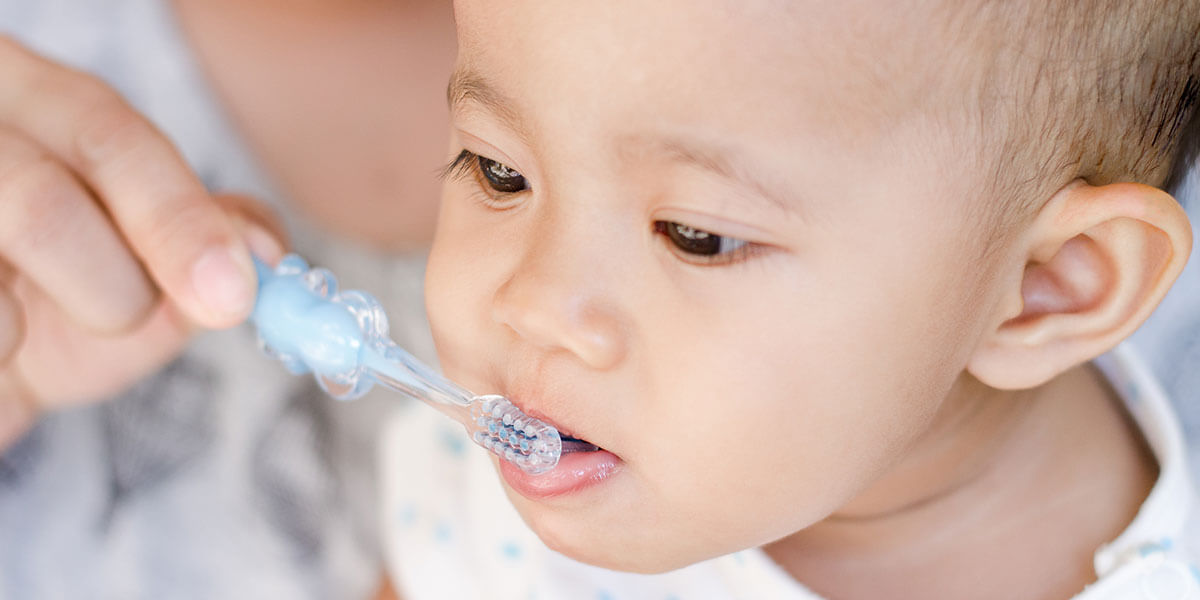Early Dental Care

When should my child first see the dentist?
The American Academy of Pediatric Dentistry recommends that children have their first dental visit when their first tooth appears or by age one—whichever comes first. At this age, they’re starting to get their baby teeth, and Dr. Sokolosky can begin monitoring their oral health.
The goal of your child’s first dental visit at our Ellicott City dental office is not to perform any involved exam or treatment. We want your little one to get the most positive start with dentistry, and the best way we can do that is by letting them get used to the new experience at their pace.
Each successful visit helps build their confidence, and in no time at all, they will come to see that the dental office is not a scary place.
Your Child's First Dental Visit
Your child’s first dental visit is meant to be a fun adventure where they get to meet new people in a friendly and caring environment. We proceed slowly, and at a pace your child is comfortable with. We’ll give them a ride in the dental chair, count their teeth, and let them look in the little mirror.
If your son or daughter is relaxed and receptive to it, our Columbia, MD dentist will look at their teeth to see if there are any signs of obvious problems. We know that the first visit can be a little overwhelming for adults too, so you are always welcome to stay with your child throughout their appointment.
Dr. Sokolosky may recommend bringing your child in as soon as their baby teeth come in. The latest we would recommend for your child’s first dental visit would be one year. While it’s always exciting to introduce your child to a building block for future success, it’s entirely reasonable for parents to feel apprehensive and nervous.
How will your child react? Will they be scared, or will their innate curiosity be enough to overcome any apprehension they feel? The bottom line is that all parents want to know that their child is safe and that their first visit with us is a positive experience. Dr. Jennifer Sokolosky loves helping and caring for kids, so there’s one less thing you need to worry about!
She understands that every child is different, and she will never pressure a child who is unsure or not ready. We make the first “Happy Visit” fun and relaxing by turning it into a fun time by counting teeth, getting pictures taken, and showing them how the dental chair can be fun. Depending on your child’s age, we may showcase proper brush and flossing techniques.
Your child’s treatment is paced according to their level of comfort, and we’ll gradually work together until they feel comfortable enough for a dental cleaning. This visit isn’t meant to accomplish a lot of treatment (if any at all), but it is a valuable opportunity for us to talk to you about childhood oral health habits. We’ll discuss brushing and flossing correctly as well as advise you about potential problems like thumb-sucking and bottle-feeding.
Importance and Care of Primary Teeth (Baby Teeth)
Baby teeth, also called primary teeth, are shed, but they are still very important for a number of reasons. Children need strong, healthy baby teeth in order to chew food properly, to pronounce words correctly, and to maintain space in the jaw for the permanent teeth. That is why it is important to take good care of the primary teeth by keeping them clean and healthy.
Even before the first tooth erupts, your child’s gums should be wiped gently with a wet cloth or gauze after every feeding. At the appearance of the first tooth, begin brushing your child’s teeth with water. Children older than 2 years should be supervised during brushing to ensure that only a pea-sized amount of fluoride toothpaste is used, and that the toothpaste is spit out rather than swallowed, and they rinse with water afterward.
Preventing Decay
Primary teeth, if not kept clean and healthy, can develop decay. This decay can lead to infection, which can damage permanent teeth. Tooth decay in infants and young children occurs when the teeth undergo frequent and extended exposure to liquids containing sugar. To keep your child’s teeth cavity free and avoid oral pain, do not allow your child to fall asleep with a bottle containing anything other than water. Milk, formula, and juice, when given to a child right before they fall asleep, can remain on the teeth and in the mouth and cause tooth decay. If your child needs a pacifier between feedings or at bedtime, give them a clean pacifier. Do not give your child a pacifier dipped in honey or sugar.
